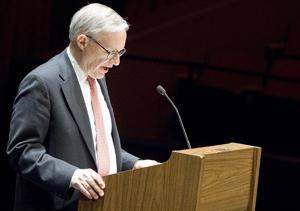
unknown
The Harrelson Lecture series welcomed Leon Kass, former chair of the President’s Council on Bioethics, yesterday in Stewart Theatre. A crowd of University scholars, students and faculty interested in bioethics met Kass’ lecture, entitled “The Challenge for Bioethics.”
Before beginning his lecture, Kass asked for the lights in Stewart Theatre to be raised to illuminate those listening in the audience. Kass said he was interested in a discussion rather than dictating a lecture to a faceless mob.
As chair of the President’s Council on Bioethics, Kass was instrumental in the formation of the administration’s policies toward stem-cell research, cloning and in vitro fertilization.
Kass posed questions at the beginning of his lecture to help shed light on issues that are highly debated and controversial.
“Some of these challenges are practical and political. Can we govern where biotechnology is taking us and if so how?” Kass asked. “Other challenges are philosophical and moral. What is the human and ethical significance of the new biology and of the powers it makes possible for satisfying an ever-expanding array of human desires?”
He answered with the stance and goal he and the Bush administration have adopted.
“We have aspired in everything we have done to identify precisely what is humanly at stake and which human goods we should be eager to promote and vigilant to defend,” Kass said.
These policies have reflected, as Kass puts it, what a majority of Americans feel. He attempted to clear up the misconception stem-cell research is illegal in the United States, which it is not. Under the current administration’s policy, those wishing to perform stem-cell research may do so, but without any funding from the federal government. Human cloning, however, is illegal.
Kass did vehemently reiterate he “is not an enemy of biomedical science and technology — just the reverse.”
He does worry about the steps bioethics takes with issues that could be morally reprehensible, in his opinion.
“We are promised new and effective routes to better children, superior performance, ageless bodies and happy souls,” Kass said. “Ritalin for the young, Viagra for the old, Prozac for everyone and to leave this veil of tears a little extra morphine to Musak.”
A major point of reference for Kass’ lecture was Aldous Huxley’s novel Brave New World, published in 1932, in which humanity has become completely engineered in the future. Kass made the distinction that he does not see our world as a mirror of Huxley’s novel, but rather progressing towards it.
“Brave New World is, of course, science fiction. Our Prozac is not yet Huxley’s Soma. Cloning by nuclear transfer is not exactly Bokanovskization. Computer games, MTV and virtual reality parlors are not quite the ‘feelies.’ And our current state of consequenceless sexual practices are not universally as loveless or resenting as those in the novel,” Kass said. “But the kinships I’m describing, all the more so since our technologies of bio-psycho-engineering are still in their infancy, yet they vividly reveal what they might look like in their full maturity. Moreover the cultural changes technology has already wrought amongst us should make us even more worried than Huxley would have had us be when he saw us coming.”
Kass said he was concerned with the science being practiced that might throw ethics to the side in order to achieve feats just because they are possible, including stem cell research.
“Few people pay attention to the meaning of using the seeds of the next generation as a tool for saving the lives of the present one,” Kass said.
Even more so, he said he worried about the state of humanity because of our decisions and what we have become because of the power afforded by technology.
“Fewer people yet worry about the effects — not on the embryos, but on our embryo-using society — of coming to look on basic human life as a natural resource to be mined, exploited and commodified,” Kass said. “The little embryos are merely destroyed but we, their users, are corrupted, desensitized and denatured by a coarsening of sensibilities that comes to regard these practices as natural, ordinary and fully unproblematic. People who can hold nascent human life in their hands unblinkingly and without awe have deadened something in their souls.”
The lecture ended with questions posed by the audience concerning more specific issues like Kass’ position on reproduction for same-sex couples and the dangers associated with other countries’ progression towards cloning, gender selection, stem cell research and organ markets.
Tom Hoban, a professor of sociology, was curious as to how animals factored into Kass’ ethics.
“Remember it was Ghandi who said that you can judge a nation by the way they treat their animals,” Hoban said, although time did not permit him to ask his question to Kass.
Daniel Pisciottano, a sophomore in electrical engineering, said he took a lot home from the lecture.
“I thought it was a very well-presented lecture and I thought he posed some very good questions,” Pisciottano said. “Although he did make the distinction that he didn’t necessarily agree with everything.”
Bobby Mills, a freshman in political science, said he saw a problem in what could be described as a highly technical lecture.
“A lot of it you needed to be an expert on to create judgment,” Mills said. “For most of us the material he was discussing is over our heads because we don’t have any tangible backup.”
Mills said he did leave with lessons that could be applied to a larger problem he sees with technology.
“I think it’s even more deep rooted toward technology in general,” Mills said. “The biggest argument as a society is where we want to go, because we are on that road right now. There’s a fork and sometimes we just want to take the fork.”